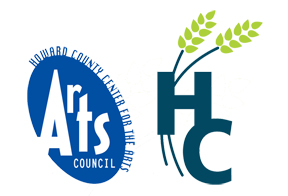Experiencing Tyehimba Jess read his verse at the Blackbird Poetry Festival in April 2017 was like watching Cirque de Soleil with words.
Jess, who had won the Pulitzer Prize a few weeks before he arrived to read for HoCoPoLitSo, stood at the front of Smith Theatre and flashed on-screen his poems and pictures of the minstrel musicians that were the subjects of his compositions. In a demonstration of poetic acrobatics, Jess then proceeded to read his works forwards, backwards, diagonally, and circularly.

His collection, Olio, speaks in the voices of the Black musicians from the minstrel tradition, the main form of theater in America from 1830 until 1910. White actors and singers put on blackface and performed degrading caricatures of Black people.
But some Black artists made their creative living in minstrel shows. In Olio, Jess writes their stories: Henry Box Brown, Edmonia Lewis, Sissieretta Jones, Scott Joplin, Williams and Walker, the Fisk Jubilee Singers, the McCoy twins–talented performers who worked in the only venues available to them.
Jess seeks to give full voice to the artists’ stories, instead of making insulting, two-dimensional representations of the performers, as the shows did. The pages in his book Olio can be ripped out, Jess explained.
“The reader is invited to deconstruct the book,” Jess told E. Ethelbert Miller in the edition of The Writing Life they filmed together. “The pages are perforated so the pages easily tear out of the books. So you can use the poems in their form to manipulate them. You’re going from a two-dimensional form to a three-dimensional composition, in much the same way that many of the performers were working in a two-dimensional strata and had to take the received instrument and bend it.”
In this week’s HoCoPoLitSo Poetry Moment, Jess reads “Blind Tom Plays On,” the last in a sonnet series about Tom Wiggins, born blind, a slave, and autistic. By age 4, he had become a savant piano player. With uncanny talent, Wiggins could imitate sounds, repeat reams of speech, and compose and play music. One of his “tricks” was to perform three pieces of music–playing one song with one hand, another with his second hand, and singing a third song. James Bethune and his family owned Tom most of his life, and profited to the tune of nearly a million dollars from his talents, with Tom receiving only subsistence from them.
Though marketed as a freak, Wiggins’ gifts were prodigious. Wiggins was a composer as well as a mimic, including “The Rainstorm”, one of a series of works recorded in 1999 by pianist John Davis.
Jess’s poems pay tribute to Wiggins’ strange genius, and to the mother that protected him as much as she could, from slavery, and from the people that sought to exploit him. One of Jess’s other sonnets in the series ends with the following lines, starting with the metaphor of teeth as piano keys:
Jangle up its teeth until it can tell
our story the way you would tell your own:
the way you take darkness and make it moan.
Susan Thornton Hobby
Producer of The Writing Life




